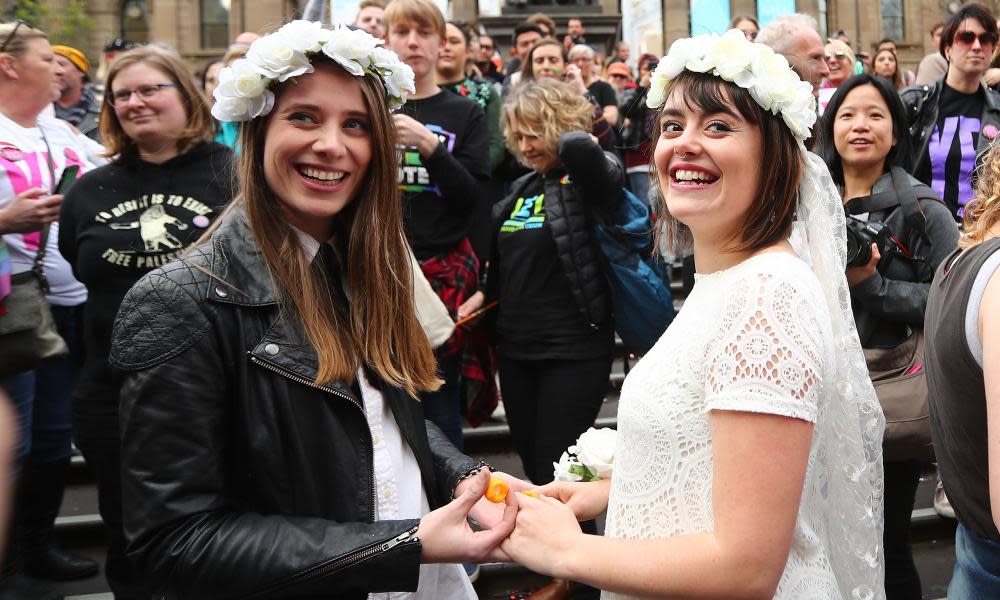Voters back right to refuse to carry out same-sex weddings – Guardian Essential poll

Most Australians surveyed in the latest Guardian Essential poll think both ministers of religion and celebrants should be able to refuse to officiate at same-sex marriage weddings, while 43% think businesses should be able to refuse service.
The new weekly poll of 1,803 voters showed Australians were divided about whether additional protections are required when marriage equality is legalised by the Australian parliament following last week’s historic majority yes vote by the public.
A solid majority of the sample – 63% – supported allowing ministers of religion and celebrants to refuse to officiate same-sex weddings, with 27% opposed.
That concept had majority support across all major voting groups – Coalition (74%), Labor (56%), Greens (53%) and voters supporting someone other than the major parties (75%).
With the Coalition gearing up for an internal battle about religious protections as the marriage bill written by the Liberal senator Dean Smith is debated in parliament between now and Christmas, the attorney general, George Brandis, has already flagged an amendment allowing civil celebrants to reject same-sex weddings.
Other protections that have been floated thus far during the debate were more controversial. More people (48%) thought businesses should not be able to refuse service at gay weddings than supported that idea (43%).
When it came to the rights of parents to remove their children from classes that do not reflect a traditional view of marriage, 44% of the sample opposed the idea and 42% supported it.
The sample was split evenly about the desirability of people seeking court orders, injunctions and damages if they believed they had been victimised on the basis of their marriage beliefs (41% support and 41% opposition).
Men were somewhat more likely to support additional protective measures than women. On allowing service providers to refuse to supply their services, men were at 49% support/42% opposition, while women were 37% support/53% opposition.
A majority of Coalition voters supported commercial discrimination by service providers (54%) and parental rights to remove children from classes (52%).
Asked a broader question about whether additional religious protections were required if marriage equality was legalised, 37% of the sample thought same-sex marriage legislation needed to include more protections for religious freedoms, while 42% argued current laws sufficed.
Right-wingers in the government, including the treasurer, Scott Morrison, and the resources minister, Matt Canavan, have declared religious protection should not be hived off to a separate process in the new year but should be considered “in one job lot”.
Smith has suggested a separate inquiry process would allow issues of religious freedom to be aired without delaying the passage of marriage equality, or fracturing the current cross-party consensus that exists for his private members bill. The conservative powerbroker Peter Dutton has flagged that a separate process in the new year is “potentially” OK.
With continuing political instability prompting the Turnbull government on Monday to cancel a week of sitting by the lower house, voters were also asked their views on an early election.
More voters thought the government should run its full term (47%) rather than call an early election (37%), with those most likely to support an early election Labor (45%) and Greens voters (55%).
Voters were more likely to think Labor would win the next federal election than not (36% to 20% thinking the Coalition will win), with 18% believing there will be a hung parliament.
This week’s poll has Labor continuing with an election-winning lead on the two-party preferred measure. Labor is ahead 52% to 46%, the same as last week.
Voters were also asked about the health of the system, with 44% thinking Australia’s political and economic system was fundamentally sound but needed refining, and 32% thinking the system needed fundamental change.
The latest voter sentiment is an improvement on the view from January. People thinking the political system needs fundamental change has dropped eight points since January. Perhaps unsurprisingly, “other” voters were the most likely to back fundamental change.
When it came to trust, 42% had a lot or some trust in the government to do what was right for Australia and 53% had not much or no trust.
People least likely to trust the government were Greens and “other” voters. Those most likely to trust the government were Coalition voters (66% trust) and people with university education.
The sample split when it came to satisfaction with the way democracy was working, with 35% satisfied and 32% dissatisfied. People most likely to be satisfied were Coalition voters (53%), men (40%) and people with university education (51%). People most likely to be dissatisfied were Greens voters (43%) and other voters (54%).

 Yahoo News
Yahoo News 
